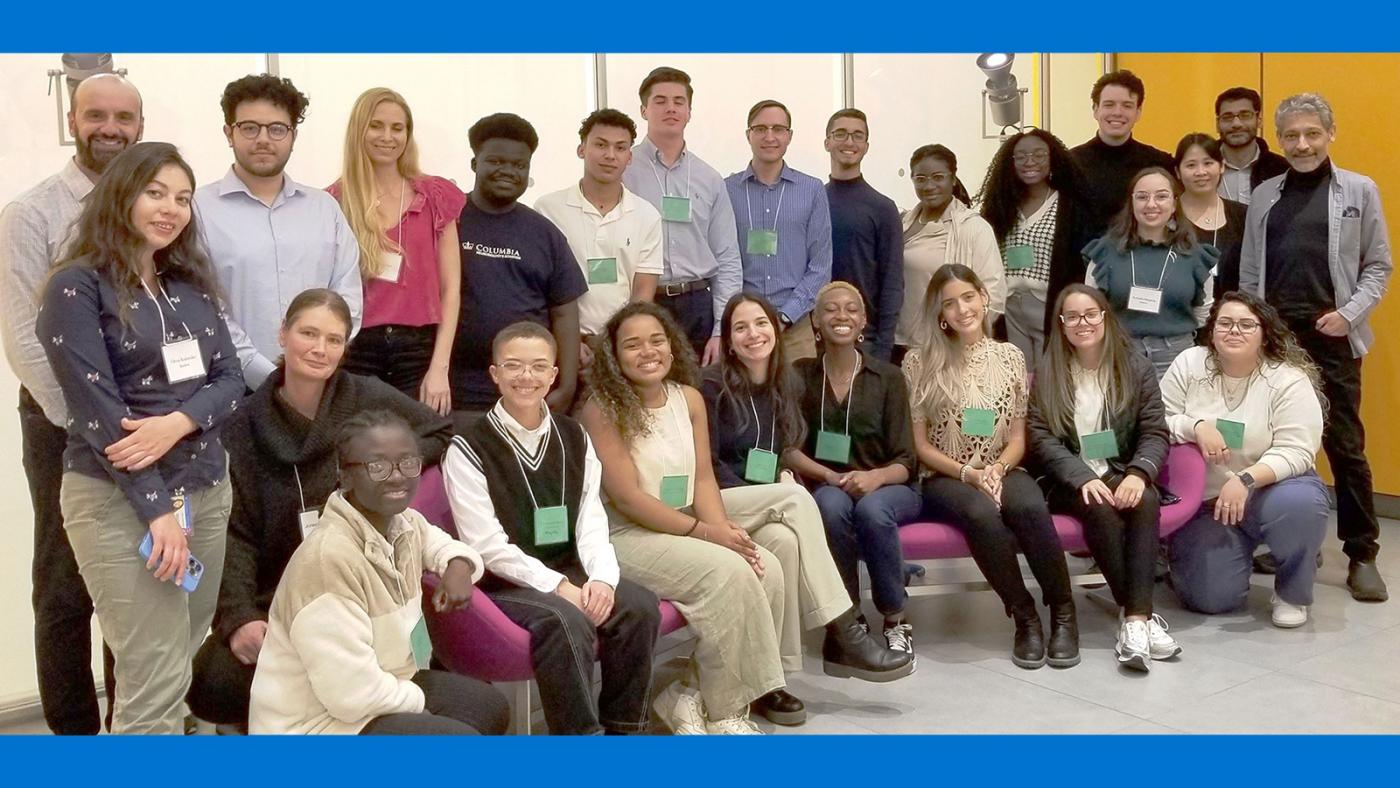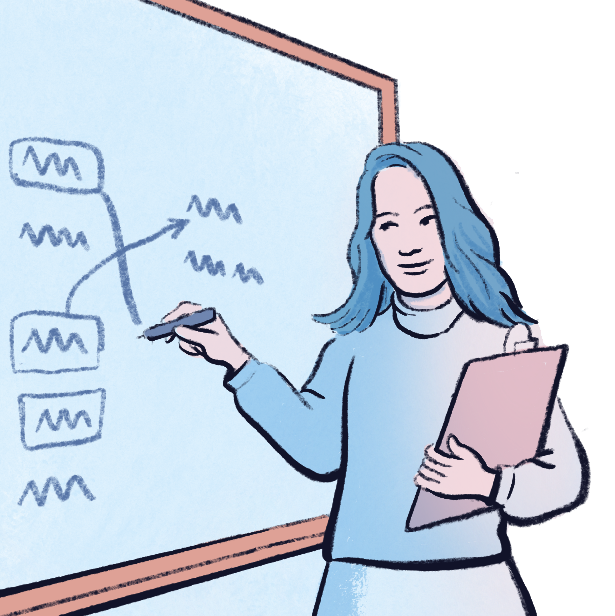NEW YORK, NY — In the summer of 2020, as demands for social justice and equity intensified following the murder of George Floyd, a coalition of students, researchers and professors at Columbia created what would become known as Columbia Access Neuroscience, or CAN.
“We felt a need to do something specific, something tangible, which could lead to people having some real change in their lives,” said Aniruddha Das, PhD, an associate professor of neuroscience and director of diversity initiatives for Columbia’s Doctoral Program in Neurobiology and Behavior.
CAN, which is administered by Columbia's Department of Neuroscience, began with a detailed two-page email from Kimberly Hernandez Palacios, a first-generation Mexican-American student who a year earlier had begun her graduate studies in the Neurobiology and Behavior program. She credits exposure to scientists who look like her, and to programs that introduced her to neuroscience, for helping her reconceive herself as a future neuroscientist. She hoped to open others to the same kinds of inspiration.
On her own initiative, Palacios sent an email to the codirectors of Columbia's Neurobiology and Behavior program, Wes Grueber, PhD, a professor of physiology and cellular biophysics and of neuroscience and a principal investigator at the Zuckerman Institute, and Darcy Kelley, PhD, Harold Weintraub professor of biological sciences at Columbia's Department of Biological Sciences. Palacios had a number of ideas for further diversity in neuroscience. One of those ideas was to organize a weekend-long neuroscience immersion program for students from underrepresented backgrounds.
Drs. Grueber and Kelley brought Palacios’s ideas to Dr. Das who, at about the same time, had helped start a set of joint student-faculty working groups whose goal was to transform new diversity ideas into concrete actions. During the fall of 2020, one of the working groups crystallized around Palacios’s proposal. With Palacios and Dr. Das as key members, the group rapidly turned the proposal into the blueprint for Columbia Access Neuroscience.
Within months, CAN had become operational. In the summer of 2021, it held its first two-day workshop to equip undergraduates and recent graduates from underrepresented backgrounds with the knowledge and tools to navigate the path to graduate school. CAN’s two-day bootcamps in both 2021 and 2022 took place virtually during the pandemic. About 35 students in all participated.
At the latest April workshop, a new batch of 16 participants convened in-person at Columbia’s Manhattanville campus at the Jerome L. Greene Science Center, home of the Zuckerman Institute. They hailed from across the country, from neighboring Queens to California to Puerto Rico. The students identify as coming from Hispanic, Black and other economically underserved backgrounds that have not had equal access to the profession of science.
During the weekend bootcamp, the CAN class heard inside accounts of graduate life from those living it. They learned about neuroscience research from investigators doing it. They found out what it takes to become a successful grad-school applicant from those who have been through the process, on both the applicant and reviewer sides. They gained insight about the career options a PhD might afford them.
“This year’s Columbia Access Neuroscience program was a success,” Vanessa Lecorps, the Zuckerman Institute’s chief diversity officer, said on LinkedIn. In the same social media thread, Pedro Torres Morales, one of six students from Puerto Rico in attendance, specified some of the program's deliverables: “I got to meet graduate students and get great advice from faculty members. Also, I got the chance to share ideas with students from different places and cultures with the same love for neuroscience.”
We felt a need to do something specific, something tangible, which could lead to people having some real change in their lives.
Michael Flores, a 2021 CAN alum, attended last April’s bootcamp to help welcome this year’s students. Originally from Peru, Flores emigrated to the United States at the age of three. His mother, who was training to become a nurse in Peru, inspired Michael to explore his own interests in biology and medicine. Along that pursuit, he earned a bachelor’s degree in biology at New York University and has been working as a lab assistant at the Icahn School of Medicine at Mount Sinai.
“The CAN experience made me want to try to make a career out of neuroscience,” said Flores. “Talking with graduate students, learning about their different areas of neuroscience research and hearing about the cool techniques was exciting. And it was inspiring to see people who, like me, are from underrepresented groups, but were at a great university like Columbia getting PhDs in neuroscience. Until CAN, I hadn’t really thought I could make it all of the way and become a professional neuroscientist.”
Flores was recently accepted into six neuroscience doctoral programs and will start this Fall at the University of California, San Francisco. For the support he needed to get into graduate school, Flores credits his mentors at NYU, Mount Sinai and Columbia. He also points to his CAN experience and the organization Científico Latino for providing advice, know-how and camaraderie in ways that make the STEM environment feel more inclusive and equitable.
Nora Wolf is another CAN alum. A former undergraduate at Queens College in New York, she’s now in her first year of a psychology graduate program at the University of California, Davis. One of the most valuable features of the CAN program was the practice interview, she recalled.
“The encouraging feedback I received made me feel better about my chances of getting into graduate school and helped me identify what I needed to work on,” she said. “I also gained access to mentors whom I could reach out to for advice later as I was applying to grad school. The whole experience reassured me that I was on the right track, and that this path really was an option for me. It boosted my confidence and helped me build a support network, making it an incredibly helpful experience.”
Wolf also noted a striking symmetry at UC with its Neuroscience Initiative to Enhance Diversity, a program dating back almost a decade. As an undergraduate, Palacios had participated in the initiative and that experience helped inspire her proposal for CAN in 2020.
Dr. Das, who has mentored many CAN participants before, during and after their time in the program, is grateful for the financial and administrative support from the Department of Neuroscience, the Neurobiology and Behavior program and the Zuckerman Institute.
Amanda Anqueira-González, a graduate of the University of Puerto Rico and currently a graduate student in the Neurobiology and Behavior program, took over as a student leader for CAN when Palacios stepped down in 2022. At the same time, the staff of the Neurobiology and Behavior program have started handling the bulk of CAN’s routine administration.
"We would like to move CAN from something that has been completely student initiated and driven to something that will have a momentum and infrastructure of its own," said Dr. Das.
In addition to CAN, a complementary program is just getting off the ground. Like CAN, the Columbia Access to Doctoral REadiness (CADRE) program focuses on helping students from underrepresented groups prepare for neuroscience graduate programs. A collaboration between Columbia's Department of Neuroscience, Doctoral Program in Neurobiology and Behavior and the Zuckerman Institute, CADRE is funded by a research education grant through the National Institute of Neurological Disorders and Stroke.
Whereas CAN caters primarily to undergraduates, CADRE’s signature feature is a fully paid, two-year, post-baccalaureate research program initiated by the Neurobiology and Behavior program. The CADRE program, funded with a research education grant through the National Institute of Neurological Disorders and Stroke, is designed for those who have recently finished their undergraduate degree but have yet to experience mentored laboratory research, a de facto prerequisite for many graduate programs. CADRE’s first four students began their new research adventures with a welcome breakfast on June 1 at the Zuckerman Institute.
“There is also some overlap in the people running the two programs,” said Dr. Das. “Me, for example.” The programs share common goals, too. “We are actively fostering a more inclusive, egalitarian and welcoming culture in science,” said Dr. Das.

